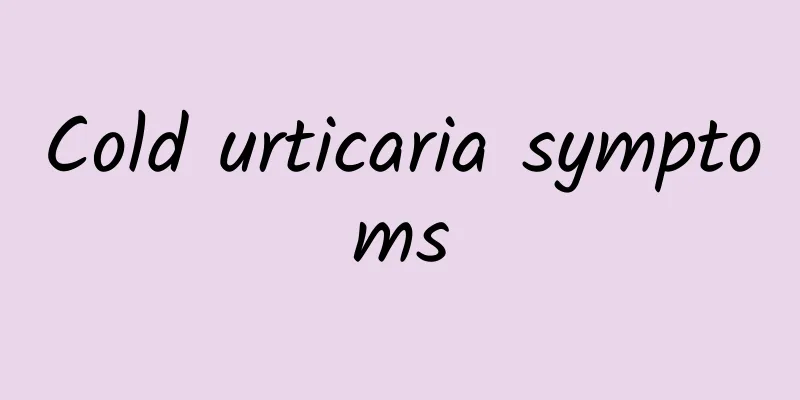Cold urticaria symptoms

|
In the cold winter, some people will inexplicably experience skin itching, rashes and other discomfort symptoms on their hands, faces and other parts. In severe cases, it may also cause headaches, dizziness, low blood pressure, etc. What is going on? Doctors point out that such conditions are usually symptoms of cold urticaria. So, what exactly is cold anesthesia? Urticaria is a common skin disease in our lives, and many people are familiar with it. The so-called cold urticaria is a disease in which the skin is prone to discomfort in cold weather. So, now let’s learn about the symptoms of cold urticaria. Cold urticaria, which is prevalent in winter, is a special type of urticaria. It is an allergic reaction caused by the human body being exposed to a cold environment. Edema and wheals often occur in areas immersed in cold water or in contact with cold substances. It is more common on the face and hands, but may also affect other parts of the body. People feel itchy and some also have systemic symptoms such as headache, skin flushing, and hypotension. In severe cases, shock may occur. In addition, there is a familial cold urticaria that often occurs in infancy and can be seen as early as 1 week after birth. Patients develop a rash half an hour to four hours after exposure to cold. The rash is non-itchy and consists of erythema and wheals, accompanied by systemic symptoms such as fever, fear of cold, joint pain, and headache. Cold urticaria is the most common type of physical urticaria and can occur at any age. There are two types: familial and acquired. The former is an autosomal dominant inheritance, which can occur after birth or in early years and can last a lifetime. The latter is more common in young women. The characteristic of this disease is that after contact with cold water or other cold substances, itchy edema and wheals appear in the cold area, which disappear in about half an hour to an hour. It often occurs in exposed parts such as the face and hands, and in severe cases other parts of the body may also be affected. The mucous membranes of the mouth, tongue, pharynx, etc. may also become edematous and even cause abdominal pain when exposed to cold food or drinks. The main clinical manifestations of cold urticaria are itching and wheals that appear in different parts of the body when exposed to cold conditions. Skin lesions can be limited to areas exposed to cold conditions or areas in contact with cold objects, or they can be widespread, involving the oral mucosa, and even manifest as headaches, chills, diarrhea, and tachycardia. This disease is more common in winter because there are more opportunities to come into contact with cold objects. Acquired cold urticaria is inherited in an autosomal dominant manner. Acquired cases may be autoimmune allergic reactions. Histamine release plays a certain role in the onset of the disease, which can be seen in cryoglobulinemia. The characteristics of this disease are: 1. After contact with cold water or other cold substances, itchy edema and wheals will appear in the cold area, which will disappear in about half an hour to an hour. 2. It often occurs in exposed parts such as face and hands. In severe cases, other parts of the body may also be affected. The mucous membranes of the mouth, tongue, pharynx, etc. may also become edematous and even cause abdominal pain when exposed to cold food or drinks. 3. More common in young women. 4. It is often accompanied by headaches. In severe cases, symptoms such as low blood pressure and syncope may occur. Swimming in cold water or taking a cold shower may cause shock or even death. 5. Place ice cubes on the patient's forearm skin, which may cause typical wheals in that area after two minutes. Therefore, patients who are prone to cold urticaria are advised to pay special attention to keeping warm and maintaining personal hygiene in the cold winter. At the same time, once symptoms of cold urticaria appear, it is recommended to go to the hospital for examination and treatment in time to avoid delaying the disease and seriously endangering your health. |
>>: Can I drink milk tea while taking Chinese medicine?
Recommend
Where to apply acupuncture for hiccups
Hiccups are something that everyone will encounte...
Red Bean and Coix Seed for Cold Body Type
Many people know that red beans and coix seeds ca...
What are the symptoms of stomach cramps?
Gastric spasm is also a stomach disease, and pati...
The efficacy and contraindications of coral grass
Coral grass is a pure plant that grows in humid c...
Can scraping cure diseases?
Many people have tried scraping, and some people ...
Homemade whitening mask that works fast
Facial mask is one of the must-have beauty produc...
How to treat intercostal neuralgia and costochondritis
When intercostal neuralgia and costochondritis oc...
How to prepare your body before transplanting frozen embryos?
In order to increase the success rate of frozen e...
Symptoms of Mycoplasma pneumoniae infection
Pneumonia caused by Mycoplasma pneumoniae is alre...
Why is my lower body itchy?
For women, due to their special physiological cha...
What should I do if the sides of my mouth are rotten?
The phenomenon of sores on both sides of the mout...
Ingredients of Zhibai Dihuang Wan
Zhibai Dihuang Wan mainly has the effect of promo...
What are the effects and functions of scutellaria baicalensis?
Many people may not be familiar with scutellaria ...
Seven TCM health regimens to keep you healthy for life!
Health preservation has always been the unremitti...
Can I get pregnant if I have sex during my period?
Menstruation is a special period. You will not ge...









